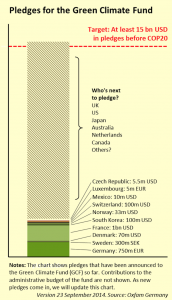
ECO sat through 4 long days and one very long night in Barbados last week, but it was worth it. The Green Climate Fund Board finally agreed upon arrangements to receive contributions this year, and further prepared the governance system to start disbursing funds next year.
Not all negotiators will know that the issue of whether contributors could include specific “targets” within their contributions was the one issue that kept board members up until 3:30 AM on Saturday. Developing countries firmly rejected this idea, despite the imminent threat that developed country treasuries were sure to contribute less if this extra grip on the GCF’s purse strings was relinquished.
ECO sees hope and feels that this step highlights the GCF as an entity that could herald a new era in international cooperation, where country ownership and direct access to funding replaces the old model of institutions and decisions dominated by developed countries. Developing countries could have an equal say in fund governance.
Some fights have yet to be fought, though, like whether the GCF will fully steer clear of fossil fuels. ECO has learnt that the idea to tie voting to contributions may rise again, but for now, things seem to be moving in the right direction, albeit slowly and unevenly.
The next milestone is the Pledging Session in Berlin in November. Developing countries are calling for $15 billion in pledges, which ECO considers to be an adequate sum, though modest compared to the scale of the climate challenge and the benefits of preventing dangerous climate change.
Developed countries, led by Germany and France, have pledged around $2.3 billion so far. Some smaller and typically more responsible countries are likely to once again make their citizens proud by shouldering more than their fair share. There are still big question marks around the USA, Japan and the UK and whether they will step up to the mark.
ECO notes that Canada and Australia are two worrying question marks too. Whilst they have been conspicuously silent about their responsibility for making substantial contributions, ECO is confident that good sense will prevail. Perhaps it will be triggered by forthcoming serious contributions, even from developing countries – though it is developed countries that have the legal and moral obligation to pledge.
Contributions in the “double digit billions” scale will certainly improve the prospects of a positive outcome in both Lima and Paris. However, a finance package demonstrating developed countries’ willingness to make progress on the $100 billion a year promise by 2020, must include robust provisions on climate finance. For the post-2020 agreement, the overall challenge to shift the trillions in public and private finance away from fossil fuels towards renewable energies and solutions compatible with equitable and sustainable development must also be a part.![]()